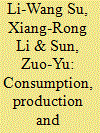|
|
|
Sort Order |
|
|
|
Items / Page
|
|
|
|
|
|
|
| Srl | Item |
| 1 |
ID:
093502


|
|
|
|
|
| Publication |
2010.
|
| Summary/Abstract |
Methanol production from biomass is a promising carbon neutral fuel, well suited for use in fuel cell vehicles (FCVs), as transportation fuel and as chemical building block. The concept used in this study incorporates an innovative Absorption Enhanced Reforming (AER) gasification process, which enables an efficient conversion of biomass into a hydrogen-rich gas (syngas) and then, uses the Mitsubishi methanol converter (superconverter) for methanol synthesis. Technical and economic prospects for production of methanol have been evaluated. The methanol plants described have a biomass input between 10 and 2000 MWth. The economy of the methanol production plants is very dependent on the production capacity and large-scale facilities are required to benefit from economies of scale. However, large-scale plants are likely to have higher transportation costs per unit biomass transported as a result of longer transportation distances. Analyses show that lower unit investment costs accompanying increased production scale outweighs the cost for transporting larger quantities of biomass. The unit cost of methanol production mostly depends on the capital investments. The total unit cost of methanol is found to decrease from about 10.66 R/l for a 10 MWth to about 6.44 R/l for a 60 MWth and 3.95 R/l for a 400 MWth methanol plant. The unit costs stabilise (a near flat profile was observed) for plant sizes between 400 and 2000 MWth, but the unit cost do however continue to decrease to about 2.89 R/l for a 2000 MWth plant. Long term cost reduction mainly resides in technological learning and large-scale production. Therefore, technology development towards large-scale technology that takes into account sustainable biomass production could be a better choice due to economic reasons.
|
|
|
|
|
|
|
|
|
|
|
|
|
|
|
|
| 2 |
ID:
126487


|
|
|
|
|
| Publication |
2013.
|
| Summary/Abstract |
Methanol is considered as one of the potential materials for fossil-based fuels because of its available applications in the fields of fuels and chemical materials. China has become the biggest methanol production country since 2006; hence, analysing the consumption, production and transportation of methanol in China has great importance. In the present article, the current status of methanol from production to consumption in China has been systematically described. Chinese industry and statistics data are introduced to analyse and discuss the total and segmental methanol amount in both production and consumption. In China, most of the methanol is primarily consumed in the synthesis of formaldehyde, alternative fuels and acetic acid, with the corresponding percentages of 35.0%, 33.0% and 8.0%. In 2011, about 22.27 million tons of methanol was generated on site, of which, 63.7%, 23.0% and 11.3% were produced by coal, natural gas and coke-oven gas, respectively. As regards transportation, approximately 82.6% of methanol was transported by overland freight, 9.0% by sea and the rest 8.4% by train.
|
|
|
|
|
|
|
|
|
|
|
|
|
|
|
|
|
|
|
|
|